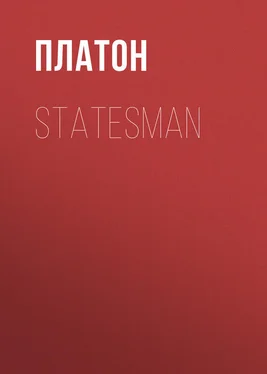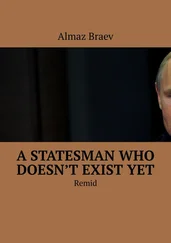Платон - Statesman
Здесь есть возможность читать онлайн «Платон - Statesman» — ознакомительный отрывок электронной книги совершенно бесплатно, а после прочтения отрывка купить полную версию. В некоторых случаях можно слушать аудио, скачать через торрент в формате fb2 и присутствует краткое содержание. Жанр: Философия, foreign_antique, foreign_prose, на английском языке. Описание произведения, (предисловие) а так же отзывы посетителей доступны на портале библиотеки ЛибКат.
- Название:Statesman
- Автор:
- Жанр:
- Год:неизвестен
- ISBN:нет данных
- Рейтинг книги:5 / 5. Голосов: 1
-
Избранное:Добавить в избранное
- Отзывы:
-
Ваша оценка:
- 100
- 1
- 2
- 3
- 4
- 5
Statesman: краткое содержание, описание и аннотация
Предлагаем к чтению аннотацию, описание, краткое содержание или предисловие (зависит от того, что написал сам автор книги «Statesman»). Если вы не нашли необходимую информацию о книге — напишите в комментариях, мы постараемся отыскать её.
Statesman — читать онлайн ознакомительный отрывок
Ниже представлен текст книги, разбитый по страницам. Система сохранения места последней прочитанной страницы, позволяет с удобством читать онлайн бесплатно книгу «Statesman», без необходимости каждый раз заново искать на чём Вы остановились. Поставьте закладку, и сможете в любой момент перейти на страницу, на которой закончили чтение.
Интервал:
Закладка:
And now enough of centaurs and satyrs: the play is ended, and they may quit the political stage. Still there remain some other and better elements, which adhere to the royal science, and must be drawn off in the refiner's fire before the gold can become quite pure. The arts of the general, the judge, and the orator, will have to be separated from the royal art; when the separation has been made, the nature of the king will be unalloyed. Now there are inferior sciences, such as music and others; and there is a superior science, which determines whether music is to be learnt or not, and this is different from them, and the governor of them. The science which determines whether we are to use persuasion, or not, is higher than the art of persuasion; the science which determines whether we are to go to war, is higher than the art of the general. The science which makes the laws, is higher than that which only administers them. And the science which has this authority over the rest, is the science of the king or statesman.
Once more we will endeavour to view this royal science by the light of our example. We may compare the state to a web, and I will show you how the different threads are drawn into one. You would admit – would you not? – that there are parts of virtue (although this position is sometimes assailed by Eristics), and one part of virtue is temperance, and another courage. These are two principles which are in a manner antagonistic to one another; and they pervade all nature; the whole class of the good and beautiful is included under them. The beautiful may be subdivided into two lesser classes: one of these is described by us in terms expressive of motion or energy, and the other in terms expressive of rest and quietness. We say, how manly! how vigorous! how ready! and we say also, how calm! how temperate! how dignified! This opposition of terms is extended by us to all actions, to the tones of the voice, the notes of music, the workings of the mind, the characters of men. The two classes both have their exaggerations; and the exaggerations of the one are termed 'hardness,' 'violence,' 'madness;' of the other 'cowardliness,' or 'sluggishness.' And if we pursue the enquiry, we find that these opposite characters are naturally at variance, and can hardly be reconciled. In lesser matters the antagonism between them is ludicrous, but in the State may be the occasion of grave disorders, and may disturb the whole course of human life. For the orderly class are always wanting to be at peace, and hence they pass imperceptibly into the condition of slaves; and the courageous sort are always wanting to go to war, even when the odds are against them, and are soon destroyed by their enemies. But the true art of government, first preparing the material by education, weaves the two elements into one, maintaining authority over the carders of the wool, and selecting the proper subsidiary arts which are necessary for making the web. The royal science is queen of educators, and begins by choosing the natures which she is to train, punishing with death and exterminating those who are violently carried away to atheism and injustice, and enslaving those who are wallowing in the mire of ignorance. The rest of the citizens she blends into one, combining the stronger element of courage, which we may call the warp, with the softer element of temperance, which we may imagine to be the woof. These she binds together, first taking the eternal elements of the honourable, the good, and the just, and fastening them with a divine cord in a heaven-born nature, and then fastening the animal elements with a human cord. The good legislator can implant by education the higher principles; and where they exist there is no difficulty in inserting the lesser human bonds, by which the State is held together; these are the laws of intermarriage, and of union for the sake of offspring. Most persons in their marriages seek after wealth or power; or they are clannish, and choose those who are like themselves, – the temperate marrying the temperate, and the courageous the courageous. The two classes thrive and flourish at first, but they soon degenerate; the one become mad, and the other feeble and useless. This would not have been the case, if they had both originally held the same notions about the honourable and the good; for then they never would have allowed the temperate natures to be separated from the courageous, but they would have bound them together by common honours and reputations, by intermarriages, and by the choice of rulers who combine both qualities. The temperate are careful and just, but are wanting in the power of action; the courageous fall short of them in justice, but in action are superior to them: and no state can prosper in which either of these qualities is wanting. The noblest and best of all webs or states is that which the royal science weaves, combining the two sorts of natures in a single texture, and in this enfolding freeman and slave and every other social element, and presiding over them all.
'Your picture, Stranger, of the king and statesman, no less than of the Sophist, is quite perfect.'
…
The principal subjects in the Statesman may be conveniently embraced under six or seven heads: – (1) the myth; (2) the dialectical interest; (3) the political aspects of the dialogue; (4) the satirical and paradoxical vein; (5) the necessary imperfection of law; (6) the relation of the work to the other writings of Plato; lastly (7), we may briefly consider the genuineness of the Sophist and Statesman, which can hardly be assumed without proof, since the two dialogues have been questioned by three such eminent Platonic scholars as Socher, Schaarschmidt, and Ueberweg.
I. The hand of the master is clearly visible in the myth. First in the connection with mythology; – he wins a kind of verisimilitude for this as for his other myths, by adopting received traditions, of which he pretends to find an explanation in his own larger conception (compare Introduction to Critias). The young Socrates has heard of the sun rising in the west and setting in the east, and of the earth-born men; but he has never heard the origin of these remarkable phenomena. Nor is Plato, here or elsewhere, wanting in denunciations of the incredulity of 'this latter age,' on which the lovers of the marvellous have always delighted to enlarge. And he is not without express testimony to the truth of his narrative; – such testimony as, in the Timaeus, the first men gave of the names of the gods ('They must surely have known their own ancestors'). For the first generation of the new cycle, who lived near the time, are supposed to have preserved a recollection of a previous one. He also appeals to internal evidence, viz. the perfect coherence of the tale, though he is very well aware, as he says in the Cratylus, that there may be consistency in error as well as in truth. The gravity and minuteness with which some particulars are related also lend an artful aid. The profound interest and ready assent of the young Socrates, who is not too old to be amused 'with a tale which a child would love to hear,' are a further assistance. To those who were naturally inclined to believe that the fortunes of mankind are influenced by the stars, or who maintained that some one principle, like the principle of the Same and the Other in the Timaeus, pervades all things in the world, the reversal of the motion of the heavens seemed necessarily to produce a reversal of the order of human life. The spheres of knowledge, which to us appear wide asunder as the poles, astronomy and medicine, were naturally connected in the minds of early thinkers, because there was little or nothing in the space between them. Thus there is a basis of philosophy, on which the improbabilities of the tale may be said to rest. These are some of the devices by which Plato, like a modern novelist, seeks to familiarize the marvellous.
Читать дальшеИнтервал:
Закладка:
Похожие книги на «Statesman»
Представляем Вашему вниманию похожие книги на «Statesman» списком для выбора. Мы отобрали схожую по названию и смыслу литературу в надежде предоставить читателям больше вариантов отыскать новые, интересные, ещё непрочитанные произведения.
Обсуждение, отзывы о книге «Statesman» и просто собственные мнения читателей. Оставьте ваши комментарии, напишите, что Вы думаете о произведении, его смысле или главных героях. Укажите что конкретно понравилось, а что нет, и почему Вы так считаете.










